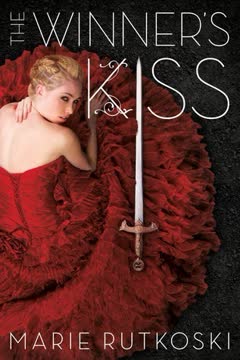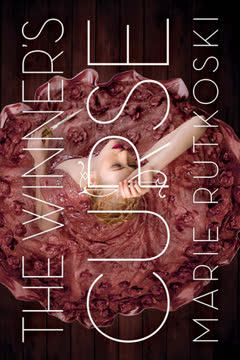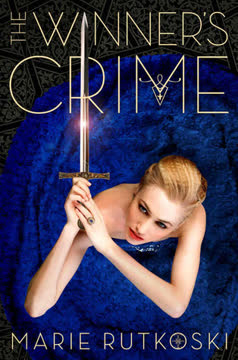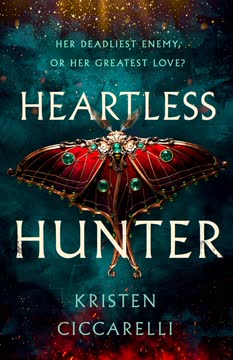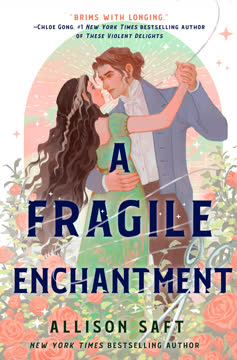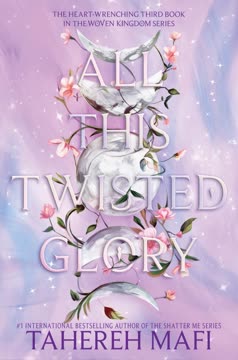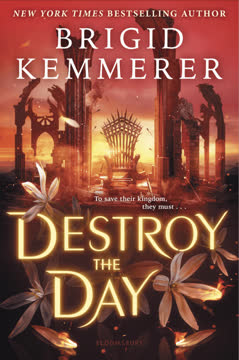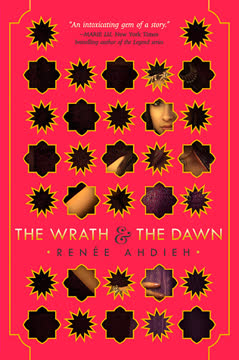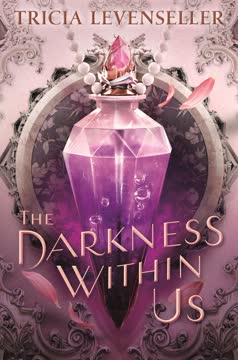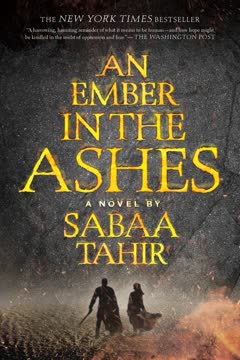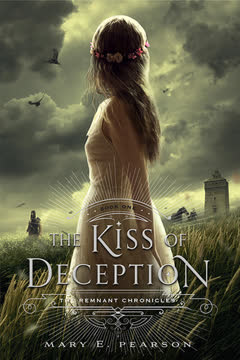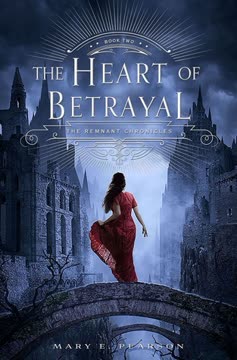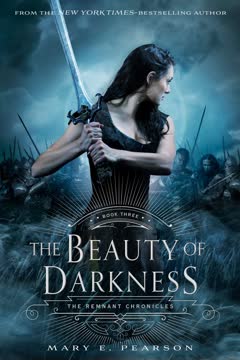Plot Summary
War's Edge and Poisoned Waters
Arin, haunted by his past and the god of death, races home to Herran, where the Valorian Empire has poisoned the city's water. He forges a desperate alliance with the Dacran queen, planning a naval ambush. The battle is brutal but victorious, yet Arin's mind is never far from the trauma of his family's slaughter and the betrayal of Kestrel, the Valorian general's daughter. The city's survival is fragile, and Arin's heart is armored by old wounds and new suspicions. The cost of war is everywhere: in blood, in memory, and in the stories Arin tells himself to survive.
Prison of Memory and Betrayal
Kestrel, condemned by her own father for treason, is sent north to a brutal prison camp. Drugged and broken, she clings to fragments of her identity, haunted by her love for Arin and her betrayal of her people. The camp's routine is numbing, designed to erase memory and will. Kestrel's only hope is a message sent by moth—a symbol of her secret role as Herran's spy. She dreams of escape, but the drugs and despair threaten to consume her, and her father's betrayal cuts deeper than any wound.
Allies, Ghosts, and Gambits
With Herran's survival at stake, Arin navigates uneasy alliances with the Dacran prince Roshar and the queen. The city's fate depends on new weapons and old secrets. Arin is haunted by Kestrel's absence and the lies that divided them. He learns of her possible fate through a cryptic message, but war demands his focus. The lines between friend and enemy blur, and Arin's own people look to him for leadership, even as he doubts himself and mourns what he's lost.
Cliffs, Clashes, and Revelations
Arin's gamble at the cliffs pays off, ambushing Valorian Rangers and saving Herran from invasion. The cost is high, and the alliance with Dacra is strained by pride and pain. Arin's leadership is questioned, but his instincts prove right. The war's brutality is mirrored in Arin's memories and in the scars—physical and emotional—that he and his people bear. The hope of rescue for Kestrel flickers, but Arin is torn between duty and the ghosts of his past.
Messages, Moths, and Misunderstandings
A Herrani messenger brings news of a moth—a sign from Kestrel. Arin's hope is rekindled, but uncertainty gnaws at him. He learns that his trusted spymaster is dead, and that Kestrel is presumed lost. The pain of not knowing, of having failed to see the truth, drives Arin to the edge. He is forced to confront his own blindness and the lies that have shaped his life and his love.
Grief, Doubt, and Determination
News of Kestrel's supposed death devastates Arin, but he refuses to believe it. He clings to small clues—a birthmark, a memory, a moth—and pieces together the truth. His grief becomes determination, and he sets out for the tundra, risking everything to find her. The journey is as much about redemption as rescue, and Arin's heart is a battleground of hope and regret.
Tundra Rescue and Amnesia
Arin infiltrates the prison camp, finding Kestrel a shadow of herself—drugged, starved, and with no memory of him. The escape is harrowing, and Kestrel's amnesia is a wound neither can heal. Arin's joy at finding her is tempered by the pain of being a stranger to the woman he loves. The tundra is unforgiving, and survival depends on trust that Kestrel cannot give.
Escape, Wolves, and Wounds
Arin and Kestrel flee the camp, pursued by guards and haunted by wolves. The wilderness tests their bodies and their fragile bond. Kestrel's withdrawal from the drugs is agonizing, and her memory remains a void. Arin's care is met with suspicion, and the past is a chasm between them. Yet small moments of recognition and tenderness hint at the possibility of healing.
Strangers, Fears, and Fractures
As they journey home, Kestrel's fear and anger flare. She cannot remember Arin, and every kindness is suspect. Arin is tormented by guilt and longing, desperate for her to remember. Their roles—rescuer and rescued, master and slave, friend and enemy—are tangled. The journey is a crucible, burning away illusions and forcing both to confront who they are without memory or certainty.
Homecoming and Healing
Kestrel is brought to Arin's home, where Sarsine, Arin's cousin, tends to her. The process of healing is slow and fraught. Kestrel's body recovers, but her mind is fractured. The scars of the prison—literal and figurative—are revealed, and Arin's attempts to help are met with pain and anger. The house is filled with ghosts, and the past cannot be escaped.
Forgiveness, Guilt, and Truth
Arin and Kestrel grapple with guilt—his for not saving her, hers for betraying her father and her people. The truth of their choices is laid bare, and forgiveness is elusive. Sarsine's wisdom and care offer a path forward, but the wounds are deep. The question of who is to blame—Arin, Kestrel, or the world—remains unresolved, but the need for mercy and understanding grows.
Dagger, Keys, and Identity
Kestrel is given a dagger forged by Arin and the keys to the house—a symbol of trust and belonging. She struggles to reclaim her identity, piecing together memories and learning to play the piano again. The act of creation—music, weapons, love—becomes a way to heal. The past is not erased, but transformed, and Kestrel begins to choose who she will be.
Shifting Alliances and Weapons
The alliance with Dacra is tested as the queen arrives, and the threat of annexation looms. Kestrel's strategic mind is valued, and her advice on weaponry—improving Arin's gun—proves crucial. The lines between friend and foe blur, and the cost of trust is high. The war's outcome depends on shifting loyalties and the willingness to risk everything for freedom.
Storms, Sacrifice, and Strategy
Arin leads a daring raid at sea, risking his life and surviving by luck and determination. The war grinds on, and every victory is paid for in blood. Kestrel's role as strategist grows, but the threat of betrayal is ever-present. The storm—literal and metaphorical—tests every alliance, and the future is uncertain.
Sea Battles and Survival
Arin's survival at sea cements his reputation as god-touched, but the experience leaves him changed. The brutality of battle, the loss of friends, and the weight of leadership press on him. The war is a crucible, forging new strengths and exposing old weaknesses. The line between survival and surrender is razor-thin.
Queens, Politics, and Power
The arrival of the Dacran queen shifts the balance of power. Kestrel is displaced from her rooms, and the politics of alliance become personal. The question of who will rule Herran—Arin, the queen, or someone else—hangs over every decision. Love and loyalty are tested, and the cost of power is measured in trust and betrayal.
Gardens, Ghosts, and Choices
Kestrel confronts the ghosts of her home, her father, and her own choices. The garden is a place of memory and possibility. The decision to fight, to forgive, and to love is not easy, but it is necessary. The past cannot be changed, but the future is unwritten, and Kestrel claims her agency.
Letters, Loss, and Loyalty
Letters—written, lost, and found—carry the weight of love and regret. Friends depart, alliances shift, and the cost of loyalty is counted. Kestrel and Arin's bond deepens, but the war demands sacrifice. The question of what is worth fighting for—country, love, self—becomes urgent.
Battlefields, Blood, and Bargains
The war reaches its climax with brutal battles on the road and at the beach. Kestrel risks everything to destroy the Valorians' black powder, while Arin faces the general in a fight for vengeance and mercy. The cost of victory is high, and the bargains made—between friends, lovers, and enemies—will shape the future.
Games, Poison, and Endings
Kestrel challenges the emperor to a game of Bite and Sting, cheating with poisoned tiles. The emperor's death ends the war, but not the pain. Arin faces the choice of vengeance or mercy with Kestrel's father, and both must reckon with what they have become. The war is over, but the struggle to heal and forgive continues.
Mercy, Memory, and Moving On
The city celebrates victory, but the wounds of war linger. Kestrel and Arin must learn to live with their choices, to forgive themselves and each other. The future is uncertain, but love endures. The story ends not with triumph, but with the quiet hope of healing, music, and the promise of a life remade together.
Characters
Arin
Arin is a Herrani who survived the Valorian conquest as a child, marked by trauma and the loss of his family. Raised in slavery, he is driven by vengeance, guilt, and a longing for freedom. His relationship with Kestrel is fraught with betrayal, love, and misunderstanding. Arin is both a strategist and a craftsman, forging weapons and alliances. He is haunted by the god of death, whose voice is both a comfort and a curse. Arin's journey is one of transformation—from victim to leader, from vengeance to mercy, from isolation to love. His psychological depth is rooted in survivor's guilt, a desperate need for agency, and the struggle to forgive himself and others.
Kestrel
Kestrel is the daughter of the Valorian general, raised in privilege but drawn to music and intellect over war. Her love for Arin leads her to betray her people and become a spy, resulting in her exile and torture. The prison camp shatters her memory and sense of self, and her journey is one of reclaiming agency and identity. Kestrel's mind is her greatest weapon, but her heart is vulnerable—wounded by her father's betrayal and her own choices. She is fiercely independent, yet longs for connection and forgiveness. Her development is a struggle between duty and desire, guilt and hope, and the search for a self that can survive both love and war.
General Trajan
Kestrel's father is the Valorian general, a man of iron discipline and loyalty to the empire. His love for Kestrel is real but conditional, and when she betrays Valoria, he chooses honor over blood. His actions—condemning his daughter to exile and torture—are both monstrous and deeply human, rooted in a worldview where duty eclipses love. Trajan's psychological complexity lies in his inability to reconcile love and loyalty, and his ultimate regret is a wound that cannot be healed.
Roshar
The Dacran prince is a survivor of Valorian brutality, marked by physical mutilation and emotional scars. Roshar's humor and bravado mask deep pain and a longing for connection. His friendship with Arin is genuine, built on shared suffering and mutual respect. Roshar is politically astute, navigating the treacherous waters of alliance and ambition. His relationship with his sister Risha is fraught with guilt and longing for forgiveness. Roshar's development is a testament to resilience, loyalty, and the possibility of healing through friendship.
Sarsine
Arin's cousin, Sarsine, is a survivor who provides emotional grounding for both Arin and Kestrel. She is practical, nurturing, and unafraid to speak hard truths. Sarsine's role is that of healer and mediator, helping Kestrel reclaim her identity and Arin confront his guilt. Her presence is a reminder of the cost of war and the importance of compassion.
Risha
The Dacran princess, held hostage by the Valorians, is a figure of both vulnerability and lethal skill. Her relationship with her brother Roshar is strained by betrayal and the scars of childhood. Risha's alliance with Kestrel and Arin is pragmatic, driven by a desire for agency and justice. She is both a symbol of the costs of empire and a catalyst for its downfall.
Verex
The Valorian prince, once Kestrel's fiancé, is a figure of kindness and quiet strength. He aids Kestrel at great personal risk, and his relationship with Risha offers hope for a different kind of future. Verex's refusal to inherit the empire is an act of moral courage, and his friendship with Kestrel is a source of comfort and regret.
The Emperor
The Valorian emperor is a figure of cold cunning, delighting in games and the exercise of power. His relationship with Trajan is one of mutual respect and manipulation. The emperor's death at Kestrel's hands is both a personal and political turning point, ending the war but not the pain he has caused.
The God of Death
The god of death is both a literal and metaphorical presence in Arin's life, representing the trauma of survival and the allure of vengeance. The god's voice is a psychological echo of Arin's pain, shaping his choices and his struggle to find meaning beyond suffering.
The Dacran Queen (Inishanaway)
The Dacran queen is a shrewd and powerful leader, whose alliance with Herran is both a lifeline and a threat. Her ambitions for Herran test Arin's leadership and the limits of trust. Her presence is a reminder that victory in war is never simple, and that power is always contested.
Plot Devices
Dual Narratives and Shifting Perspectives
This structure allows the reader to experience both the external war and the internal battles of memory, guilt, and love. The shifting perspectives heighten tension and empathy, and the gradual convergence of their stories mirrors their journey toward reconciliation.
Amnesia and Identity
Her amnesia forces a re-examination of self, love, and loyalty. The device allows for a fresh exploration of relationships, as Kestrel and Arin must rebuild trust and connection from the ground up. It also raises questions about what defines identity—memory, choice, or something deeper.
Poison, Games, and Deception
The final confrontation with the emperor is resolved not by brute force, but by cunning and deception—Kestrel's greatest strengths. The game is a metaphor for the larger war, where every move is a gamble and every victory is uncertain. Poisoned tiles, marked and hidden, symbolize the hidden costs and risks of every choice.
Foreshadowing and Symbolism
The moth represents secret messages and the hope of rescue. The dagger is both a weapon and a gift, symbolizing trust and agency. Keys represent freedom and belonging. Music is a thread of memory and healing, connecting past and present.
Mercy Versus Vengeance
Arin's confrontation with the general is the culmination of years of pain, but he chooses mercy, breaking the cycle of violence. This decision is foreshadowed by earlier moments of forgiveness and the struggle to move beyond trauma.
Political Intrigue and Shifting Alliances
The shifting loyalties of Dacra, the threat of annexation, and the personal stakes of every character create a web of intrigue. The resolution is as much about negotiation and trust as it is about battle.
Healing and Reclamation
The process of reclaiming identity, forgiving oneself and others, and building a new life is as important as the war's outcome. The story ends with music, love, and the promise of a future remade by choice and hope.
Analysis
Marie Rutkoski's The Winner's Kiss is a masterful exploration of the costs of war, the complexity of love, and the struggle for identity in the aftermath of trauma. The novel interrogates the nature of power—personal, political, and psychological—through the intertwined journeys of Arin and Kestrel. Their relationship, marked by betrayal, amnesia, and the scars of violence, becomes a crucible for questions of agency, forgiveness, and selfhood. The use of amnesia as a plot device is particularly resonant in a modern context, reflecting the ways trauma can fracture memory and identity. The story's resolution—favoring mercy over vengeance, healing over destruction—offers a nuanced vision of what it means to survive and rebuild after devastation. The novel's emphasis on strategy, cunning, and the power of choice challenges traditional narratives of heroism, suggesting that true strength lies not in domination, but in the willingness to risk vulnerability, to forgive, and to hope. In a world still grappling with cycles of violence and the legacy of empire, The Winner's Kiss is a timely meditation on the possibility of redemption and the enduring power of love.
Last updated:
Review Summary
The Winner's Kiss concludes the trilogy with high praise from readers. Many found it a perfect, emotional ending that exceeded expectations. Kestrel and Arin's character development and relationship growth were highlights. The writing style, plot twists, and side characters like Roshar were widely appreciated. Some readers felt the pacing was off or disliked certain plot elements, but overall the book was well-received as a satisfying conclusion to a beloved series.
The Winner's Trilogy Series
Similar Books
Download PDF
Download EPUB
.epub digital book format is ideal for reading ebooks on phones, tablets, and e-readers.
